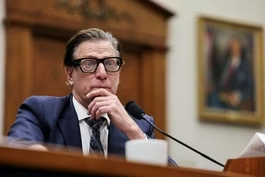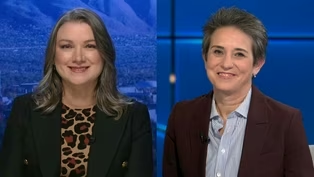
A look at Trump's overhaul of plan to end homelessness
Clip: 11/17/2025 | 5m 38sVideo has Closed Captions
A look at the Trump administration's overhaul of national plan to end homelessness
The Trump administration announced an overhaul of how it will reallocate funds for housing and the homeless. The changes involve $3.9 billion in funds used to place people in permanent housing. That money will now be shifted to programs with work requirements and mandatory treatment, and to law enforcement to support clearing encampments. Amna Nawaz discussed more with Jennifer Ludden of NPR.
Problems playing video? | Closed Captioning Feedback
Problems playing video? | Closed Captioning Feedback
Major corporate funding for the PBS News Hour is provided by BDO, BNSF, Consumer Cellular, American Cruise Lines, and Raymond James. Funding for the PBS NewsHour Weekend is provided by...

A look at Trump's overhaul of plan to end homelessness
Clip: 11/17/2025 | 5m 38sVideo has Closed Captions
The Trump administration announced an overhaul of how it will reallocate funds for housing and the homeless. The changes involve $3.9 billion in funds used to place people in permanent housing. That money will now be shifted to programs with work requirements and mandatory treatment, and to law enforcement to support clearing encampments. Amna Nawaz discussed more with Jennifer Ludden of NPR.
Problems playing video? | Closed Captioning Feedback
How to Watch PBS News Hour
PBS News Hour is available to stream on pbs.org and the free PBS App, available on iPhone, Apple TV, Android TV, Android smartphones, Amazon Fire TV, Amazon Fire Tablet, Roku, Samsung Smart TV, and Vizio.
Providing Support for PBS.org
Learn Moreabout PBS online sponsorshipAMNA NAWAZ: The Trump administration has announced a sweeping overhaul of how it will reallocate funds for housing and the homeless, triggering concerns that it could lead to more people living on the street.
The changes involve $3.9 billion in funds previously used to place people in permanent housing.
That money will now be shifted to transitional programs with work requirements and for mandatory treatment for addiction or mental illness.
For more on what's at stake and the potential impact, I'm joined by Jennifer Ludden of NPR.
Good to see you.
JENNIFER LUDDEN, NPR: Hi there.
AMNA NAWAZ: Thanks for being here.
Let's just start with how big a shift this is from the previous policy and approach and what's the reasoning behind the change?
JENNIFER LUDDEN: It's an enormous shift.
This is the main source of homelessness funding.
It's used by local programs across - - thousands of them all across the country.
And the reason is, the Trump administration has a very different philosophy for how best to tackle homelessness and really what is the root cause, as they put it, of homelessness.
They're very clear in their ideas that mental illness and addiction are the root causes.
You see this especially with the rise of street homelessness.
Encampments are in so many cities now.
And they say that this is a way to address that and help promote self-sufficiency.
And it's a major change from what has been for many years.
AMNA NAWAZ: So give us a sense of who would be impacted here.
How many people are we talking about?
Where are they in the country?
And who do you have to be to qualify for these funds in the first place?
JENNIFER LUDDEN: So it's really focused -- the change really focuses a lot on chronically homeless people, people who have been chronically homeless and are now in permanent housing, what's called permanent supportive housing, because it's people who are offered supports for their mental health or addiction or finding a job, but it's voluntary.
And this is what the Trump administration wants to make mandatory.
And to be in these permanent housing situations, you have to have been chronically homeless and also have some kind of disabling condition.
There's a lot of seniors.
And that is who homeless advocates are fearful that might lose their current housing.
And in some cases, they have been there for years.
AMNA NAWAZ: Yes.
So how real or reasonable is it to try to impose a work requirement if many of these recipients are disabled in some way or elderly?
JENNIFER LUDDEN: So the people who work to house them say it's really unrealistic, that you are talking about those with the greatest need.
I mean, to be clear, plenty of homeless -- people enter homelessness and leave it on their own, right?
We are talking about people who've been without housing for a longer period of time, they have more complicating conditions, and it is harder, a harder lift for them.
And the other thing that advocates point out is like, OK, the administration wants to put them into temporary housing situations up to maybe two years.
And then the housing market itself is incredibly unaffordable.
Even for middle-income people with full-time jobs, it can be hard to afford rent.
So to expect that for this population could be unrealistic.
AMNA NAWAZ: So I have seen some estimates that say we're talking about maybe 170,000 people or up to 170,000.
Give us a sense of how quickly this could have an impact, and would this impact that many people right away?
JENNIFER LUDDEN: I mean, we don't know how many.
That's the number that advocates say is at risk.
AMNA NAWAZ: OK.
JENNIFER LUDDEN: But it could happen fast.
I mean, this -- people will start having to apply for this funding in January.
And there are groups around the country who are already going to start running out of their current funding starting in January.
And there's actually a gap here, because this was a late notice.
It's kind of behind schedule.
Some places might lose the funding they have before they even get this, if they are going to get this funding.
But the administration has been clear that a lot of places won't get their funding renewed.
They want to widen the number of places that are helping homeless people.
They want to get new faces at the table.
And so it's a big question mark that what is going to happen to people who are now in housing and may lose it?
AMNA NAWAZ: I'm sure you have seen in your reporting there are a lot of people who argue there should be work requirements in place for people to receive these kinds of federal funds.
If you have an addiction or you have a mental illness, you should be required to get some kind of treatment for that to receive federal funds.
What's the response to that you hear?
JENNIFER LUDDEN: So researchers and homelessness advocates say that the U.S.
tried requiring mandating treatment for many, many, many years starting in the '80s up until early '90s or early 2000s and it didn't work.
People didn't do it.
They say forcing treatment on someone just backfires.
They need to want that.
And also they say that, look, the whole point of spending this money is to address homelessness and to get people off the street.
Permanent housing ends homelessness.
If you're focused more on their treatment, that's a different thing.
That's Medicaid.
That's health care.
If the goal here is to end homelessness, permanent housing does that.
And there is a lot of evidence over years that this model of getting people in the housing first and letting them choose treatment does succeed in keeping most people off the streets long term.
AMNA NAWAZ: A lot more to cover on this.
We hope you will come back and update us as we learn more.
Jennifer Ludden of NPR, thank you so much.
JENNIFER LUDDEN: Thank you.
Epstein files vote expected on Tuesday after Trump's shift
Video has Closed Captions
Clip: 11/17/2025 | 7m 21s | Epstein files vote expected in House on Tuesday after Trump's sudden shift (7m 21s)
Haitians deported after fleeing to Dominican Republic
Video has Closed Captions
Clip: 11/17/2025 | 7m 40s | Haitians displaced by violence face deportation after fleeing to Dominican Republic (7m 40s)
How Charlotte is responding to Trump's immigration crackdown
Video has Closed Captions
Clip: 11/17/2025 | 6m 6s | How Charlotte is responding to Trump administration's immigration crackdown in city (6m 6s)
News Wrap: Acting FEMA head stepping down after 6 months
Video has Closed Captions
Clip: 11/17/2025 | 5m 36s | News Wrap: Acting FEMA head stepping down after 6 months (5m 36s)
Tamara Keith and Amy Walter on Trump and the Epstein files
Video has Closed Captions
Clip: 11/17/2025 | 8m 47s | Tamara Keith and Amy Walter on Trump’s Epstein files reversal (8m 47s)
White House to welcome controversial Saudi crown prince
Video has Closed Captions
Clip: 11/17/2025 | 10m 58s | Trump prepares to welcome Saudi Arabia's controversial crown prince to White House (10m 58s)
Providing Support for PBS.org
Learn Moreabout PBS online sponsorship
- News and Public Affairs

FRONTLINE is investigative journalism that questions, explains and changes our world.

- News and Public Affairs

Amanpour and Company features conversations with leaders and decision makers.












Support for PBS provided by:
Major corporate funding for the PBS News Hour is provided by BDO, BNSF, Consumer Cellular, American Cruise Lines, and Raymond James. Funding for the PBS NewsHour Weekend is provided by...





